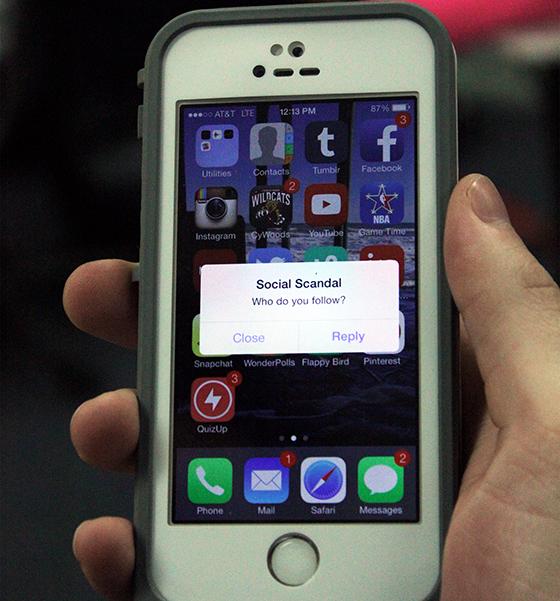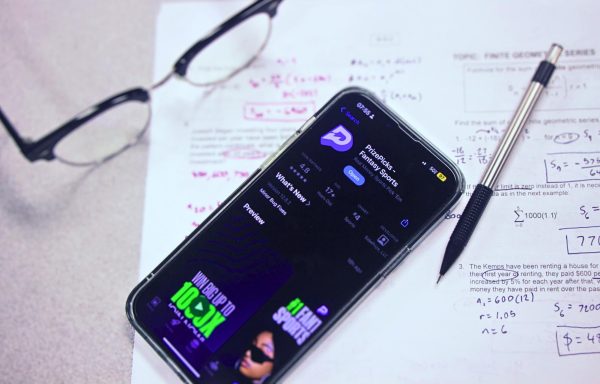Fatal Attraction
Users interact with unknown
Photo by: gennesis gonzalez-
*beep beep* the familiar sound of a new follower.
Most of our generation plugs into social media, but do we really know who’s following us? Or even who we follow?
Senior Jared Walton said he follows people out of “politeness.”
“There was this one girl,” senior Jared Walton said, “‘Jesus, she’s really attractive’ so I followed her.”
Walton said he follows to make friends, but, junior Alex Bridges doesn’t follow people unless he knows them personally.
“I don’t care to know about people I don’t know,” Bridges said.
Senior Alifya Musa said although she will not meet an online friend face-to-face, she still talks to people online.
“I feel like meeting someone I didn’t know is too risky to expose [myself] to someone I don’t know and don’t know what background they come from,” she said. “Someone messaged me; I wanted to see if I knew them, but I didn’t, and he was from London then I said bye.”
In the sea of fish online, someone is bound to get hooked. The 2010 movie ‘Catfish’ introduced us to the term ‘catfishing’ and a potentially ugly side of online life. Catfishing is defined as someone who creates a false online identity and interacts with others using this alias.
Catfish or Shark Bait
Around 40 million Americans try online dating according to AmericasFuture.org, and with that comes both success stories but also complicated situations.
Senior Emmaleigh Kercsmar created a fake Facebook profile in middle school to get to know a boy in her class.
“There was one guy who I really liked that I had history with, but he’d gotten over me,” she said. “So I made this page to convince him that we were right for each other.”
She said she introduced the person as a new Houstonian and they talked about the area and made jokes. She said it never got serious.
“It wasn’t until he expressed his feelings for the catfish that I thought about telling the truth,” Kercsmar said. “So I did.”
She said she texted him and told him she needed to be honest about the account and explained she used the account as a way to get closer to him.
“Of course, nothing that happens in middle school really matters for anything, but it was a big deal at the time,” she said. “I abandoned the page after that.”
Kercsmar said the situation upset the boy and they didn’t talk for months. She said she regrets what it did to the friendship but does not dwell on it.
“I’m about to graduate,” she said. “I’m a different person now than I was six years ago.”
Filters and Followers
Instagram boasts 100 million monthly active users. That’s 50 times the population of Houston – the fourth most populous city in the United States.
With 946 followers, sophomore Chris Oakes uses the social media site for friendships – new and old.
“I know about half of my followers because I do have long-distance friendships with people I grew up with and separated at one point,” Oakes said.
He said without social media he would not have stayed in contact with those friends or built friendships with people he does not know. Despite his active online life, Oakes said he does not have any personal experience with catfishing.
“Sometimes I follow people I don’t know because of their looks, but you see their story as well,” Oakes said.
Sophomore Jodie Monk said she keeps her profile on private and does not follow people she doesn’t know.
“It is my personal preference to have it on private,” she said. “I don’t like when people go through my things who I don’t know.”
The Twitter Machine
Junior Gaby Benavides’s Twitter account exists amidst the, according to the Digital Buzz blog, more than 20 million fake accounts parodying famous celebrities, fictional characters, and other persons.
A member on the popular social media site since July 2010, Benavides, at time of publication, hosts 857 followers on Twitter.
“I probably only know like 60 of my followers,” Benavides said.
She thinks users found her from mutual followers who retweeted her. Benavides said she got to know a lot of her followers by talking about common interests but does not worry about catfishing because she tries not to get too close with people over the Internet.
“Actually I follow a lot of people I don’t know,” she said. “I guess ‘looks’ makes me want to follow them.”
According to MediaBistro, if Twitter was a country, it would qualify as the 12th most populous in the world.
Given the amount of time and effort spent cultivating an online presence, our online lives are, in a way, our online citizenships. What kind of citizen are you?





